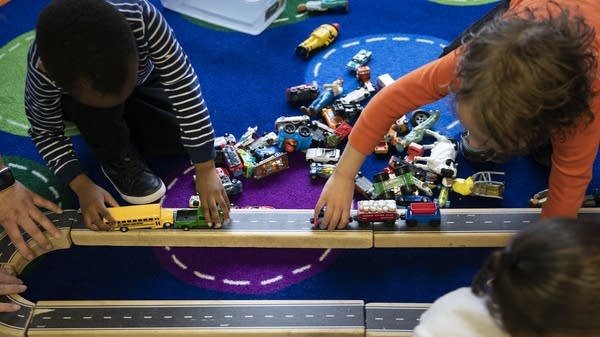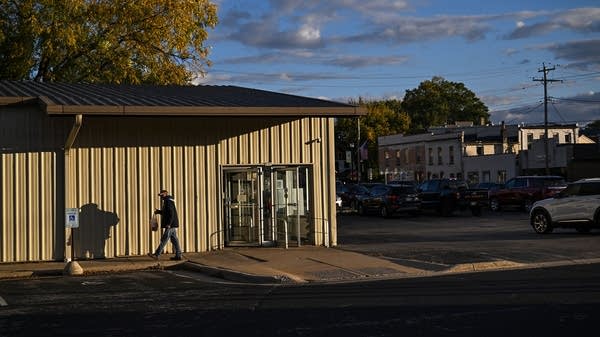Federal funding cuts has Texas food banks worried about hungry children
Food banks have less to give this summer since the federal government cut millions in USDA funding.

The food pantry at West Houston Assistance Ministries doesn’t look much different than a small grocery store. People walk down aisles and fill their carts with fruit, veggies, meats, dairy.
“They feel like they're in a supermarket atmosphere, getting the product,” said Verita Duncan, who runs the food pantry, “It's a lot more dignity.”
The food pantry has been doing more with less since their partner, the Houston Food Bank, lost some federal funding.
“Their stuff is cut. And if their stuff is cut, our stuff is cut. So, we have to find other ways to get additional products, which our clients are used to, in order to feed their family,” she said.
It’s a squeeze as the summer season begins.
“You've got more kids home, more people are hungry,” she said. “We will definitely see more people registering and those who have probably never registered before are registering so they can get food.”
At the west Houston pantry waiting for her appointment, is Julieta Gama, who said she’s got six mouths to feed at home this summer, including four school-age kids.
“They’re going to consume more, ask for more, want more,” she said in Spanish.
She makes around $800 to $2,000 a month cleaning homes. This week, from the food pantry she’ll bring home a little bit of meat, vegetables, pasta and sauce.
Without the food from the pantry, she said she would, “go to bed on an empty stomach.”
She’s one of an estimated 4 million people who go to Texas food banks each year – food banks that have less access to food due to cuts to the USDA and as nearly a quarter of the state’s children are food insecure.
“We're already distributing less than we were because of the federal cutbacks,” said Houston Food Bank CEO Brian Greene, who has seen demand pick up at the food bank in the last few years. “It's really netting out to less per household that we're able to do.”
As part of its cutbacks, the Houston Food Bank also let go of staff.
And in south central Texas, San Antonio Food Bank CEO Eric Cooper said they’ve lost significant inventory on their shelves, which they’ve tried to make up by leaning on private donors.
“We're just not making up for those lost food items and so it forces us to ration, give a little less food,” Cooper said. “Maybe where we're trying to provide a week's worth of groceries, now, we've gone to five days.”
And looking ahead to the future, Celia Cole — CEO of Feeding Texas, the state association of food banks — said she worries about proposed cuts to SNAP food assistance in the House spending bill.
“SNAP is operating at a scale that's almost ten times as great as what food banks can do. So, any cut to SNAP, even a smaller cut than the ones that are being contemplated here, leads to more people needing help from food banks,” Cole said.
The Senate is now considering the House bill, which would shift more funding responsibilities for SNAP from the federal government to the states. Cole said that is problematic for states like Texas.
“They can't deficit spend. So, when our economy is the worst and we have the least amount of revenue to spend, that's when more people are going to be needing SNAP and state legislatures are going to be even more hard pressed to find the money,” she said.
While SNAP cuts are on the table in Congress, there are already thousands of U.S.-born children in Texas who are legally eligible to receive food assistance from the federal program, but whose parents fear they could be targeted by immigration enforcement if they apply for it. It’s caused families to be hesitant to access the benefits their kids qualify for, according to Houston-area nonprofit ECHOS, which works with mixed-status families.
ECHOS serves families that earn an average of $1,300 per month and has seen food assistance applications drop 30% this year — and not because the need is less.
“They just don't want to receive any benefits, especially when it comes to the documentation that's required. It's very hard, and it's just getting harder for everybody,” said ECHOS team leader Maricela Delcid, who helps immigrant families get the benefits they or their children legally qualify for.
“It's very difficult to hear their stories from clients not being able to buy diapers for their babies, not being able to buy milk, not having gas money,” Delcid said. “We want to help. But how can we help when a lot of the funding is getting cut, when a lot of things are happening, immigration wise, money wise?”













